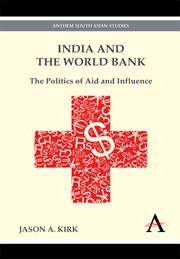Book contents
- Frontmatter
- Contents
- List of Illustrations
- Acknowledgements
- Introduction: Understanding the Bond between the World Bank and its Largest Borrower
- Chapter One The First Half-Century: From Bretton Woods to India's Liberalization Era
- Chapter Two Remaining Relevant: The World Bank's Strategy for an India of States
- Chapter Three Reasserting Central Government Control, Reorienting Aid toward “Lagging States”
- Chapter Four A Bittersweet “Graduation” from Aid: Can IDA Hold on to India, and Will India Let It?
- Chapter Five Commencement: India's Changing Relationship to Global Development Assistance
- Notes
- Bibliography
- Index
Chapter Four - A Bittersweet “Graduation” from Aid: Can IDA Hold on to India, and Will India Let It?
Published online by Cambridge University Press: 05 March 2012
- Frontmatter
- Contents
- List of Illustrations
- Acknowledgements
- Introduction: Understanding the Bond between the World Bank and its Largest Borrower
- Chapter One The First Half-Century: From Bretton Woods to India's Liberalization Era
- Chapter Two Remaining Relevant: The World Bank's Strategy for an India of States
- Chapter Three Reasserting Central Government Control, Reorienting Aid toward “Lagging States”
- Chapter Four A Bittersweet “Graduation” from Aid: Can IDA Hold on to India, and Will India Let It?
- Chapter Five Commencement: India's Changing Relationship to Global Development Assistance
- Notes
- Bibliography
- Index
Summary
A country with many poor but not a poor country.
His Excellency Mr. M. Hamid Ansari, Vice President of India (This quotation opens the World Bank's Country Strategy for India, 2009–12)Nothing will happen to India if the Bank were to disappear.
Rachid Benmessaoud, Operations Advisor, World Bank, New Delhi (2008)We are not dependent on the Bank. If it is available, we'll take it. But, it is a very small amount of money.
M. Naga Raju, Director, Fund-Bank Division, Ministry of Finance, Government of India (2008)She (we gave her most of our lives)
is leaving (sacrificed most of our lives)
home (we gave her everything money could buy)
She's leaving home
After living alone for so many years (bye-bye)
John Lennon & Paul McCartney, “She's Leaving Home” (1967)Graduation. Procession. Pomp and Circumstance. Credit hard-won achievement and recognize the devotion of time and resources by others that made it all possible. The graduate might face an uncertain future. But let that wait – first celebrate the milestone.
“Graduation” is the World Bank Group's jargon for its process of ushering a borrower out of eligibility for aid from the Bank's special soft-loan facility, the International Development Association (IDA), and into a new status as a “middle-income borrower” of only the Bank's standard loans, through the International Bank for Reconstruction and Development (IBRD). The end of aid – of access to IDA “credits” – is the essence of this graduation.
- Type
- Chapter
- Information
- India and the World BankThe Politics of Aid and Influence, pp. 137 - 180Publisher: Anthem PressPrint publication year: 2010



